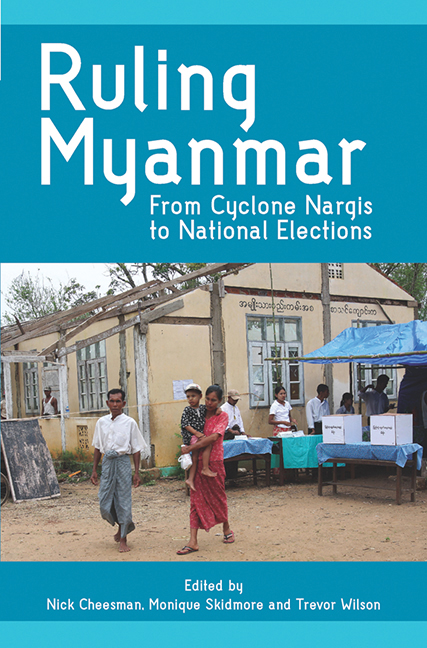Book contents
- Frontmatter
- Contents
- List of Tables
- List of Figures
- Background on ANU 2009 Myanmar/Burma Update Conference
- Acknowledgements
- Contributors and Editors
- Note on Terminology and Geographical Names
- Map of Myanmar
- Part I Overview
- Part II Political Legitimacy, Governance and Justice
- Part III Economic Development, the Rural Economy and Labour Rights
- 7 Myanmar's Response to the 2008 Global Financial Crisis
- 8 Recapitalizing Burma's Rural Credit System
- 9 Farmers, Land and Military Rule in Burma
- 10 The Movement of Rural Labour: A Case Study Based on Rakhine State
- Part IV The Role of International Cooperation and Governance
- List of Abbreviations
- Index
8 - Recapitalizing Burma's Rural Credit System
from Part III - Economic Development, the Rural Economy and Labour Rights
Published online by Cambridge University Press: 21 October 2015
- Frontmatter
- Contents
- List of Tables
- List of Figures
- Background on ANU 2009 Myanmar/Burma Update Conference
- Acknowledgements
- Contributors and Editors
- Note on Terminology and Geographical Names
- Map of Myanmar
- Part I Overview
- Part II Political Legitimacy, Governance and Justice
- Part III Economic Development, the Rural Economy and Labour Rights
- 7 Myanmar's Response to the 2008 Global Financial Crisis
- 8 Recapitalizing Burma's Rural Credit System
- 9 Farmers, Land and Military Rule in Burma
- 10 The Movement of Rural Labour: A Case Study Based on Rakhine State
- Part IV The Role of International Cooperation and Governance
- List of Abbreviations
- Index
Summary
INTRODUCTION
Burma Is in Economic Crisis
For long-time observers of the country a statement such as the above would hardly come as a surprise. Indeed, it would be regarded as little more than commonplace, and just one of the given “facts” about Burma to be absorbed as background on the way to focusing upon other things.
But Burma's economy in 2009 and 2010 is not just the serial underperformer and outlier in a region that, despite its ups and downs, is otherwise a poster-child of purpose-driven economic development. Burma's economy in 2009 and 2010 is also not one that, notwithstanding decades of extraordinary mismanagement at the hands of its military leaders, is any longer able to rely upon its abundant natural resources and alluvial dowry to protect its people from widespread food insecurity. Burma's economy in 2009 is in extremis.
There are many causes of Burma's economic crisis, most of which have a common root in the incompetence and wilful indifference of the country's policymakers. Natural disasters and global crises exacerbate Burma's economic problems, yet they are but injuries to a body rotting from the inside. Failure to acknowledge this central fact would be to misdiagnose Burma's problems and, in a sympathetic search for remedy, risk exacerbating a situation already at the verge of the intractable.
Arguably looming above all of Burma's economic problems, however, is a chronic lack of financial capital. This deficiency is apparent at all levels and sectors of Burma's economy, but is at its most critical in agriculture and in rural areas generally — the source from which most of Burma's population attempt to derive their livelihoods. Burma's agriculture sector is now almost devoid of new and affordable credit, while the cash economy is collapsing under the weight of the chronic indebtedness of the cultivator, and the absence of wage employment. This situation is most apparent in those areas of Burma that were devastated by Cyclone Nargis in 2008, but it is likewise perceptible just about everywhere else in the country.
- Type
- Chapter
- Information
- Ruling MyanmarFrom Cyclone Nargis to National Elections, pp. 126 - 146Publisher: ISEAS–Yusof Ishak InstitutePrint publication year: 2010



